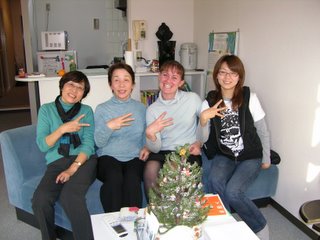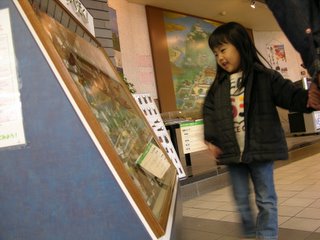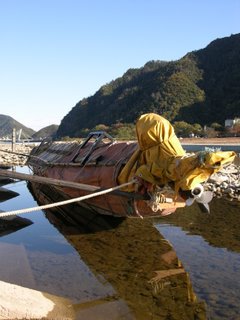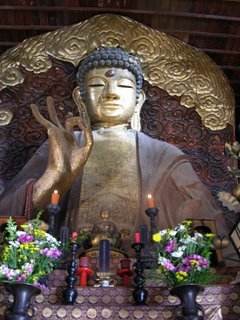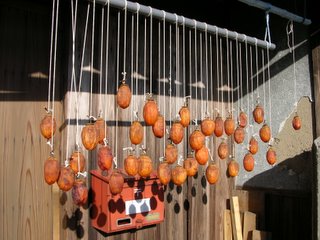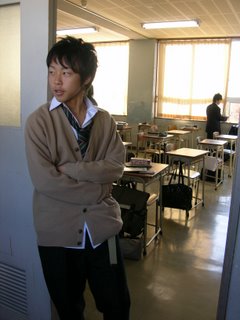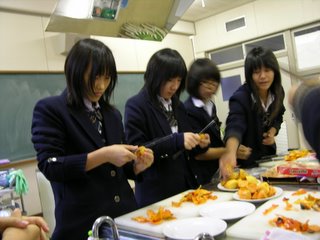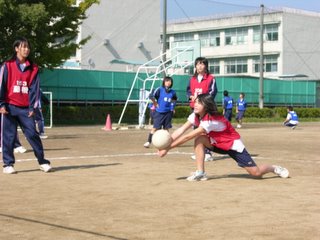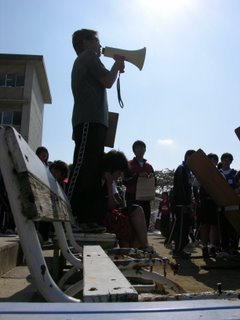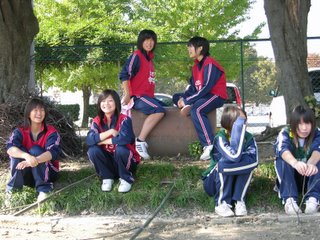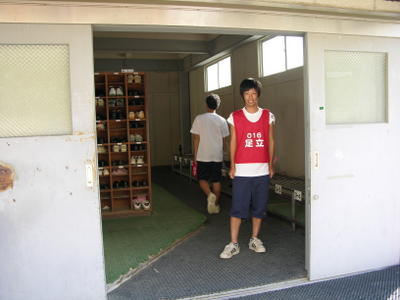In Nagoya, there is a historical "ward" called Midori ku. It hasn't appeared in any guidebooks that I have come across. I think Midori ku is somewhat popular with the Japanese, but it doesn't get too much international traffic. Midori ku is a long street of buildings that have survived many years, so each building authentic and shows edo period design. This ward is home to the art of arimatsu, or traditional Japanese tie-dye. The difference between American hippy style tie-dye and Japanese tie-dye is that the latter is born through a complicated, time consuming process. It can produce stunning results in color and design. In Midori ku many things are sold made by arimatsu: cloths for all purposes, clothing, scarves, neck ties, and umbrellas! Here is a link with pictures and an explaination of the dying process:
http://www.shibori-kaikan.com/indexE.htm
On a side note, I tried kishimen today in an udon shop in Midori ku. Kishimen is known as Nagoya's dish. Well, it was good, but alot like any other noodle-in-broth dish. Its special claim to fame is that the noodles are wider than udon noodles. Let's hear it for original Nagoya!
Wednesday, November 30, 2005
Tuesday, November 29, 2005
Dating - one perspective
I promised I'd make a comment about dating here, because it can be so frustrating. The cultural differences make it really hard. And not being able to communicate with the majority of people (Japanese speakers) makes it even more difficult to find someone to date! Cultural differences, like that the men spend more time at work, and do not have the Western "macho" attitude (for better or worse...) make it difficult to know how to relate coming from another culture with different expectations.
But on the bright side, being in Japan is a nice chance to contemplate single life.
But on the bright side, being in Japan is a nice chance to contemplate single life.
Monday, November 28, 2005
Racism in Asia, NYTimes Article
(Excerpt from the NY TIMES) TOKYO, Nov. 14 - A young Japanese woman in the comic book "Hating the Korean Wave" exclaims, "It's not an exaggeration to say that Japan built the South Korea of today!" In another passage the book states that "there is nothing at all in Korean culture to be proud of."
In another comic book, "Introduction to China," which portrays the Chinese as a depraved people obsessed with cannibalism, a woman of Japanese origin says: "Take the China of today, its principles, thought, literature, art, science, institutions. There's nothing attractive."
Interesting. Not sure what to say about this yet, because still I personally have not witnessed any hostility between Koreans and Japanese. Maybe I don't get out enough. Or maybe I don't speak Japanese or Korean!
Here is another interesting, humorous look at the problem: http://toron.pepper.jp/jp/syndrome/nation/fuckj.html
In another comic book, "Introduction to China," which portrays the Chinese as a depraved people obsessed with cannibalism, a woman of Japanese origin says: "Take the China of today, its principles, thought, literature, art, science, institutions. There's nothing attractive."
Interesting. Not sure what to say about this yet, because still I personally have not witnessed any hostility between Koreans and Japanese. Maybe I don't get out enough. Or maybe I don't speak Japanese or Korean!
Here is another interesting, humorous look at the problem: http://toron.pepper.jp/jp/syndrome/nation/fuckj.html
Sunday, November 27, 2005
Sex Ed.
Last week I wandered into the high school health office. I was interested to see a panel of wax molds of very realistic body parts with various ailments. I couldn't quite tell what it was about, so I got closer. There were about eight molds of female genitalia, all apparently affected with different STDs. It was interesting to see true-to-life female genitalia just hanging out in the school nurse's office, especially with such gruesome and true to life representation of what STDs do. At first I was shocked. We don't have these models in high schools in the US. But maybe if students see what STDs really look like, that will make them all the more informed and more likely to take care of themselves. Unfortunately there were only female examples. Maybe I am assuming too much, but I was dissapointed that the nurse's office would promote the idea that it is only a woman's responsibility to think about STDs.
Friday, November 25, 2005
Bento Box
Thursday, November 24, 2005
The Holidays and the Homeless
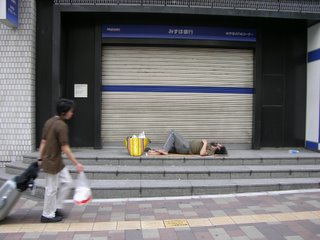
Today is Thanksgiving. Therefore, tonight's conversation with some students in Kanayama started on the premise of the holiday season. In fact, yesterday was the Japanese Labor Thanksgiving Day. I asked the women, what exactly does this mean? Is it like the American Labor Day where we give thanks for all the hard work people do? Or in Japan does it mean say to your boss "thank you please give me more work"? They said they don't know, they both had to work, so its not a real holiday anyway. OK. On to holiday number two.
So we talk about how Christmas is celebrated in Japan. The women inform me that it is primarily a time for boyfriends and girlfriends to get together, fill up the hotels in town (one of the women is a hotel reservationist, she says the phone lines have already started heating up), and exchange small gifts.
We got to talking about what Christmas means in the States. So I put forth that it has connotations of warmth, kindness and charity. Hmm.. what's charity? Like, charity drives. You know, giving stuff to people without thinking theyz gonna hand you somethin back. Like giving blankets to the homeless, or food drives. I put myself out on a limb and asked if they knew of anything in Japan like a charity drive (cuz as far as I've seen there isn't). One woman said she once saw a person giving out free food by the train station. I told her about Food Not Bombs in America, and Soup Kitchens. But she said she doesn't know about anything like those organizations. She did say she has heard that the government has set up a single shelter in the city of Nagoya (population 2million plus, the 4th largest city in Japan).
Finally she remembered a story in the news about a homeless man who lived under a blue tarp in the park. Well, he died. And when the police went to take care his mess, they found that he had stashes of money in his tarp. He was really rich, she said. I asked if she believed the story. She said yes, because she heard it from a friend. The women both came to the conclusion that Japan's only homeless demographic is the old man. The most likely reason for his homelessness is that he is tired of his job, his family, his life (or the rat race, a new vocabulary word for tonight), and has decided to drop out of society.
I don't know if I can believe this, but it is true that I have only ever seen old men sleeping on the streets and never women or children. I have also never seen anyone panhandling, or asking for money on the street. I'm not sure if it is illegal, or why it doesn't happen.
And, with 10 more minutes of conversation time left, we discussed New Year's in Japan. Traditionally, a large bell at any number of temples is ran 108 times, which symbolize "108 desires." This didn't get much more clarified within the remaining minutes, but they did mention a traditional meal that the Japanese eat with family... its called osechi.... there are many different kinds of foods that each symbolize a different kind of good luck. For example, black beans are health, salmon roe is fertility, and kale is happiness. You can eat as much as you want of any of it, which should make for a great new year.
Wednesday, November 23, 2005
Around the Block

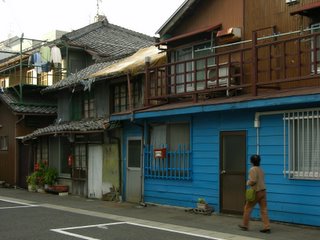
Here are some pictures from around the block, to familiarize you with my neighborhood.
 The first picture was taken outside of the small market across the street from my apartment. It always has fresh and inexpensive produce. Second, these houses are behind my apartment. If you look really hard in the upper left hand corner you might be able to see a tall greyish building: that's my place. At least from the outside, these houses are really old, small and run-down. It seems like a big, beautiful house is not usually number one on the priorities list for the Japanese. I guess it figures, since the population is about 127mil, but is approximately the size of California, pop. 33mil. In the last picture, a blurry happy kid is playing in the park in the neighborhood. Have any of these convinced you to come visit yet? I have room... please?
The first picture was taken outside of the small market across the street from my apartment. It always has fresh and inexpensive produce. Second, these houses are behind my apartment. If you look really hard in the upper left hand corner you might be able to see a tall greyish building: that's my place. At least from the outside, these houses are really old, small and run-down. It seems like a big, beautiful house is not usually number one on the priorities list for the Japanese. I guess it figures, since the population is about 127mil, but is approximately the size of California, pop. 33mil. In the last picture, a blurry happy kid is playing in the park in the neighborhood. Have any of these convinced you to come visit yet? I have room... please?
Sunday, November 20, 2005
Oba-san

A lot of elderly women in Japan have such back problems that they can no longer walk upright, or without the help of a walker. My guess of the cause would be long hours bent over in the garden and nutrition -they would have been fairly young around WWII and there was a big scarecity of food in Japan at that time. But I could be wrong.
Friday, November 18, 2005
Peeling Kaki
Tuesday, November 15, 2005
Kei in Cancun
Kei, the girl I went to Kyoto with the first time, moved to Cancun shortly after. About a week after she arrived at her new job and new home, Hurricane Wilma ripped it apart. Since the Hurricane neared Cancun, she has been staying in shelters. Her apartment and the hotel she worked at for a short time were completely destroyed. But she writes and says she's okay... and looking for a new job.
Nice Dinner Party
Kyoto

Me and Rosa, and Atsushi and Junichi in Kyoto... Rosa is a good friend; a Peruvian Japanese girl who moved here when she was 12 years old.
We went to Kyoto on Sunday and visited Kinka Kuji, the golden temple in the background. Unfortunately because of bad traffic we didn't have much time to explore Kyoto that day.
Today, Tuesday, President Bush is visiting the same place. There was a protest in Kyoto tonight at 6:30, according to an American friend studying there.
The protest was because of the War in Iraq but also because Bush wants to relocate the Okinawan US Army base to another local in the Okinawa area. Unfortunately this would displace many locals. There is a sizeable group of people who do not agree with moving the base.
Friday, November 11, 2005
foreign workers in Japan
How many people come here because of the promise of work? They are committed to a better life, to get ahead. They dream about a life where anything is possible. But the first word they learn when they arrive is the one I hear the most - "impossible." How many are they who have left school, their families, the people they love? They try to give them some help, some money, but they can't give them their presence. They fight to save money but the right amount never seems to come. They dream every day, every night, of going back to their countries, of making time go back... How many years have passed like this? Trying to create a future that maybe never comes.
How to plan a lesson
I thought I would share some of the more outstanding obstacles to planning a lesson here. My supervisors say:
"Teach about 9/11... but don't talk about politics."
"Teach about New York... but we will tell you what to say."
"Teach about Halloween, Hurricane Katrina, a chapter in our English book, how to deliver a speech, how to write a show and tell essay, and a writing a reaction essay about a picture handed out during class... all in one 45 minute class."
"Teach using news articles... but don't talk about economic equality, the environment, religion or politics."
"Teach students how to express their own opinions... but don't express yours, and don't talk about anything controversial."
"And make it interesting. But please do not use games to teach in our classes."
Any suggestions?
"Teach about 9/11... but don't talk about politics."
"Teach about New York... but we will tell you what to say."
"Teach about Halloween, Hurricane Katrina, a chapter in our English book, how to deliver a speech, how to write a show and tell essay, and a writing a reaction essay about a picture handed out during class... all in one 45 minute class."
"Teach using news articles... but don't talk about economic equality, the environment, religion or politics."
"Teach students how to express their own opinions... but don't express yours, and don't talk about anything controversial."
"And make it interesting. But please do not use games to teach in our classes."
Any suggestions?
Kanayama

Tutoring in Kanayama is probably the best thing that has happened to me since moving to Japan. It brings me into the city at least once a week. Although at the Kanayama stop there's not much more than the Boston-Nagoya Museum and the school where I tutor itself, the station is a major transportation hub. At the southside exit, everyday there are artists and musicians performing. Today there was a guy making handcrafted leather goods and handpainted t-shirts (the picture). I stopped to practice some Japanese with him and he informed me that he and his friend are walking Japan from tip to tip, selling their crafts along the way. And I thought that kind of adventure was reserved to the novels that the Japanese only have time to read on the trains between home and work. A sub-culture exists...
A Day in the Life
Tutoring English with Japanese women who are a couple years older than my mother has given me the chance to give lessons and learn about Japanese life through these ladies point of view. Today they told me about when they started dating they had arranged visits with their parents and a boy that they selected. They said it was interesting once, but after the first time... they said nothing, in typical Japanese fashion, they just winced and sucked the air in through their teeth.
Today they are both married to men they met in the office at their jobs before they were married. They smiled fondly, remembering their "office romance." As soon as they married, they both quit their jobs. About a year after marraige, they both had their first children at 28 years old. Now their husbands are the "salary men" and spend most of their time out of the house. When they do come home to their wives, it is usually later than 10pm. They ask their wives to serve them sake, and then they pass out and do it again the next day.
Today's lesson was to use the phrase, "If I had a free day and I could do ANYTHING, I would......" and we proceeded to make an itinerary for this free day from 9am to 9pm. This is their plan, if they could do ANYTHING, they would:
9am: They both would wash clothes and clean their homes.
10am: They would eat breakfast at home.
11am: One said go to sing karaoke, the other said she would go to a tea shop.
12pm: They would eat lunch.
1pm: One said she would take a nap, the other said she would watch TV.
2pm: They would dry and fold clothes.
3pm: They would both watch TV for the next two hours, suspense shows and the news.
5pm: One would start to prepare dinner. The other would go to the pool.
6pm: They would eat dinner, at home alone, because their husbands wont be home for at least another 4 hours.
7pm: They would watch more TV.
8pm: They would get ready for bed.
9pm: They would read or watch TV until they are asleep.
Today they are both married to men they met in the office at their jobs before they were married. They smiled fondly, remembering their "office romance." As soon as they married, they both quit their jobs. About a year after marraige, they both had their first children at 28 years old. Now their husbands are the "salary men" and spend most of their time out of the house. When they do come home to their wives, it is usually later than 10pm. They ask their wives to serve them sake, and then they pass out and do it again the next day.
Today's lesson was to use the phrase, "If I had a free day and I could do ANYTHING, I would......" and we proceeded to make an itinerary for this free day from 9am to 9pm. This is their plan, if they could do ANYTHING, they would:
9am: They both would wash clothes and clean their homes.
10am: They would eat breakfast at home.
11am: One said go to sing karaoke, the other said she would go to a tea shop.
12pm: They would eat lunch.
1pm: One said she would take a nap, the other said she would watch TV.
2pm: They would dry and fold clothes.
3pm: They would both watch TV for the next two hours, suspense shows and the news.
5pm: One would start to prepare dinner. The other would go to the pool.
6pm: They would eat dinner, at home alone, because their husbands wont be home for at least another 4 hours.
7pm: They would watch more TV.
8pm: They would get ready for bed.
9pm: They would read or watch TV until they are asleep.
Wednesday, November 09, 2005
Things I've Learned So Far...
Thought I'd spread the wisdom that four months in Japan has brought me.
1) I've never been more American since I moved to Japan. Afterall, it is my job. However, I've never felt more stereotyped as an American, or told I'm "not American enough" by my co-workers.
2) If everyone was as trusting as the Japanese, the world would be a much different place.
3) "Muzukashi," translation: impossible or difficult, is the first word of Japanese many foreigners learn - its telling.
4) Most Japanese women want to look more Western. Most foreign women here want to be more like Japanese.
5) White lies are essential to good relationships.
6) Trying to feed yourself sucks when you go to the grocery store and all the produce is different, you can't read packaging, and if you go to a restaurant you can't read the menu or speak enough to order.
7) Being illiterate makes you dependant on word of mouth and you miss out on alot of information.
8) A friend dropped out of a good University in Peru to come to Japan to work twelve hour shifts in a factory with an alternating shifts - every other week days, every other week nights. The promise of money will make people forget life is short and dreams are priceless.
9) Life is short, friends and dreams are worth more than any salary.
10) Japanese fashion is the best and worst thing that happened to style.
1) I've never been more American since I moved to Japan. Afterall, it is my job. However, I've never felt more stereotyped as an American, or told I'm "not American enough" by my co-workers.
2) If everyone was as trusting as the Japanese, the world would be a much different place.
3) "Muzukashi," translation: impossible or difficult, is the first word of Japanese many foreigners learn - its telling.
4) Most Japanese women want to look more Western. Most foreign women here want to be more like Japanese.
5) White lies are essential to good relationships.
6) Trying to feed yourself sucks when you go to the grocery store and all the produce is different, you can't read packaging, and if you go to a restaurant you can't read the menu or speak enough to order.
7) Being illiterate makes you dependant on word of mouth and you miss out on alot of information.
8) A friend dropped out of a good University in Peru to come to Japan to work twelve hour shifts in a factory with an alternating shifts - every other week days, every other week nights. The promise of money will make people forget life is short and dreams are priceless.
9) Life is short, friends and dreams are worth more than any salary.
10) Japanese fashion is the best and worst thing that happened to style.
I have to work this Saturday. A group of exchange students from the states are coming on Friday afternoon, so to make the most of their time here our school has decided to pretend there are classes on the weekend. Weird. I am convinced this would only ever happen in Japan. Its not even going to be a fun day, its going to be a normal school day, and I have to teach at 8:30am. In the afternoon, the exchange students and our school's band will perform some music together for the school. I also will be co-MC for this event. Today I was revising the script of what my co-MC wants me to say on Saturday. He mentioned I might want to act more "American" on stage. According to him, I act too "British." So he suggests that I borrow his American flag tie, and act loud and outgoing. Finally he asked me if its okay to ask the students to perform the song "Amazing Grace," because, isn't it a "black persons" song? I assured him it would be fine, although he should be aware it has religious meaning. He laughed and said that's okay because the Japanese don't understand Catholicism anyway.
Tuesday, November 08, 2005
Keep Busy, Keeping Sane
I'm sorry to all my loyal fans (mom and dad, anyone else out there?) but I've been very busy these last few weeks so I haven't been good about writing in the blog. But don't worry about over working myself.. the truth is, I like being busy here. It gives me less time to ponder why I am here, and whether I really like it or not. I'm afraid the answer is similar to some of the worksheets I've passed out lately, for example: I'd rather be..... (insert gerund verb).
But its good experience teaching here... And I am now spending more time in Nagoya, the big city, getting to know all parts of Japan. Keep the emails coming, I need lots of love and support before the big Japanese test this December.
But its good experience teaching here... And I am now spending more time in Nagoya, the big city, getting to know all parts of Japan. Keep the emails coming, I need lots of love and support before the big Japanese test this December.
Subscribe to:
Comments (Atom)


